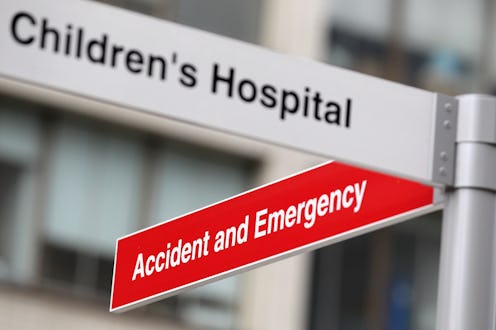News
Why Are ER Docs Pumping Kids With Codeine?
Over 25 million visits to the emergency room are made by children each year, and 500,000 of those end with kids being given drugs that could seriously harm them. According to a report published in Pediatrics Monday, ER doctors prescribe codeine to children between 560,000 to 880,000 time a year — in spite of the fact that it's a powerful painkiller with an FDA warning that, for one out of three patients, it doesn't even alleviate symptoms.
In case you missed the memo, codeine's an opiate, with the potential for some pretty intense side affects — a third of kids can't metabolize the drug well (and so don't get anything, good or bad, from taking it), while over eight percent metabolize it too quickly, creating toxic levels of morphine in their bodies that could be fatal. The American Association of Pediatrics has already told doctors to avoid prescribing it to kids twice — once in 1997, and then again in 2007. In the European Union and Canada, you need to be over 12 to get access to it.
"Codeine is a pro-drug, which means it's converted into morphine by your liver," Dr. Dyan Hes, medical director at Gramercy Pediatrics in New York, said on CBS This Morning. "Some children can ultra-metabolize this, which means they rapidly convert it to morphine and that can lead to respiratory suppression and eventually death. It doesn't have a good safety protocol profile so the Academy of Pediatrics has recommended for a long time — over 10 years — to not use codeine as a cough suppressant and it's also not effective."
The guidelines have made a difference. In the time between the two AAP warnings, rates of codeine prescriptions did decrease from 3.7 percent to 2.9 percent. Still, though, between 2001 and 2010, roughly 560,000 to 880,000 prescriptions for codeine were penned per year — meaning that, each year, up to 57,000 children who metabolize codeine quickly risk overdosing from the drug.
“We have hundreds of thousands of children still getting codeine, even though there are better and safer alternatives available,” said study author Dr. Sunitha Kaiser.
So why might that be? The general consensus seems to point to force of habit. “Codeine is an old drug. It’s a very well recognized, very commonly used. You might say it’s well-worn drug that everybody knows about,” Dr. Alan Woolf, a pediatrician at Boston Children’s Hospital, told Health. “My suspicion is many clinicians don’t really put it in the same category as other narcotics like Demerol or oxycodone.”
Dr. Hes has also pointed out that people in hospitals want some bang for their buck. "When people stay in an emergency room for six or eight hours...and they're told that their kid has a cold and they're to use a humidifier, saline drops, some tea and honey, a lot of parents get upset and they want a prescription," she said.
